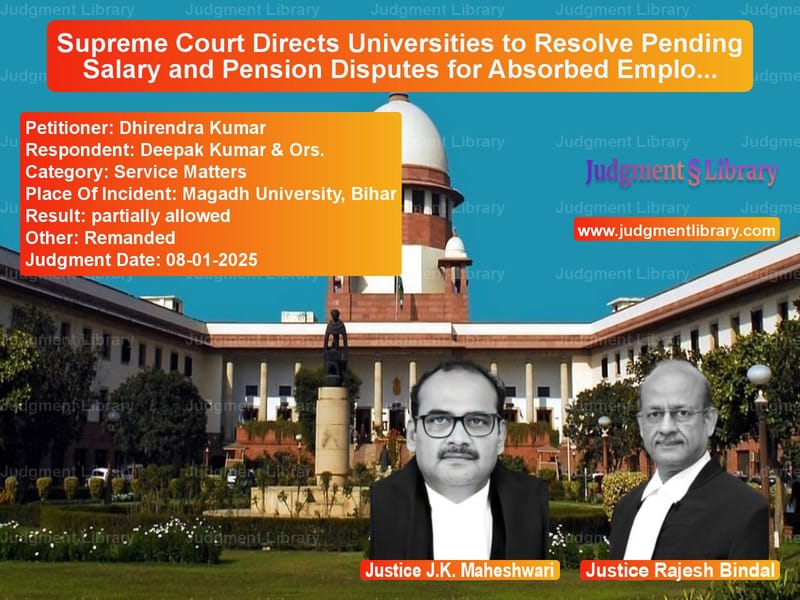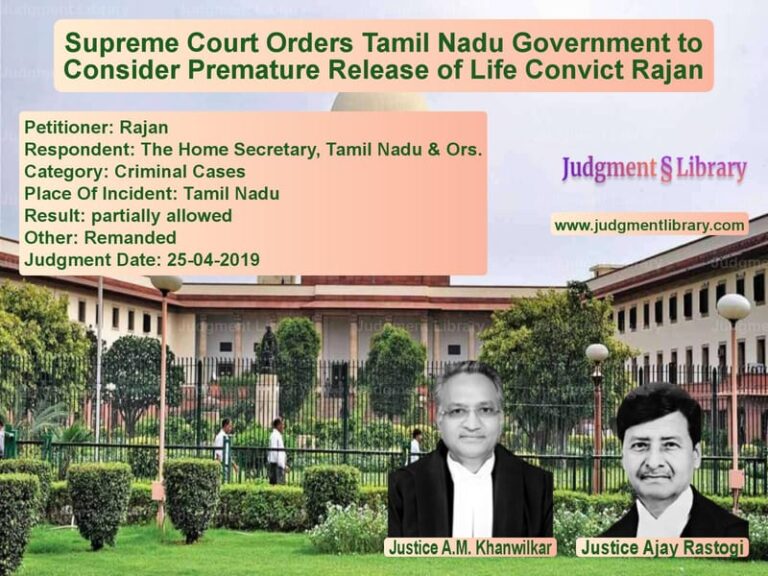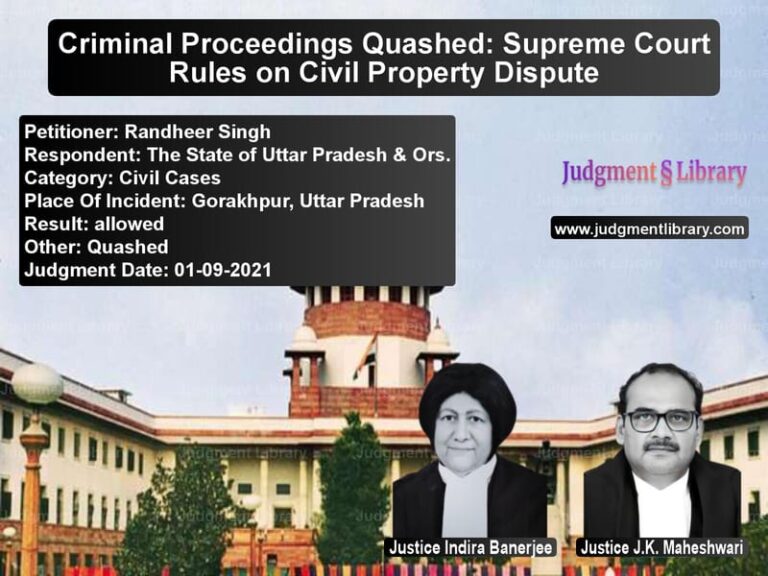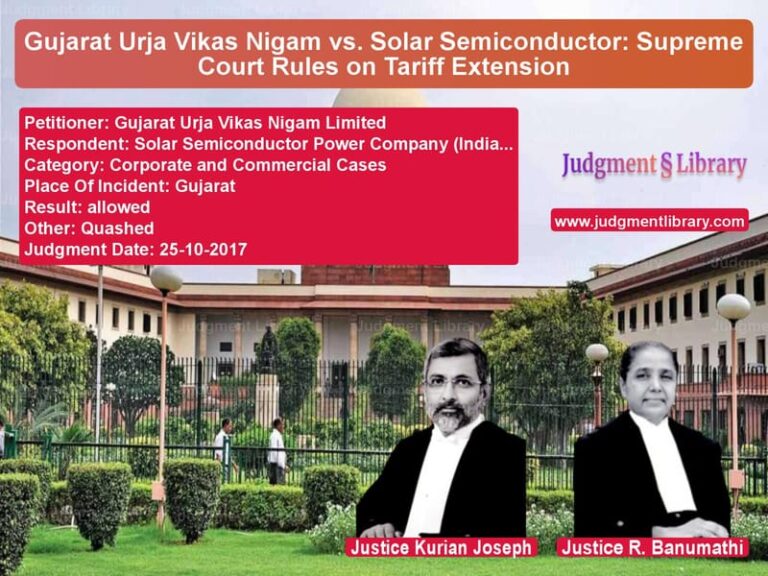Supreme Court Directs Universities to Resolve Pending Salary and Pension Disputes for Absorbed Employees
The case of Dhirendra Kumar vs. Deepak Kumar & Ors. and related contempt petitions arise from non-compliance with the Supreme Court’s earlier order dated August 31, 2017, in Civil Appeal No. 2703 of 2017. The petitions involve claims by university employees regarding arrears of salary and pension benefits following their absorption into government service.
The Supreme Court had previously approved the recommendations of the J. Sinha Commission, which had directed the state to ensure compliance within three months. However, despite multiple orders in favor of the petitioners, the concerned universities and state authorities failed to disburse the salaries and pensions, prompting the petitioners to file contempt proceedings.
Background of the Case
Several university employees had approached the court seeking enforcement of their service benefits, arguing that they had continuously worked in their respective colleges since their appointment. They contended that the delay in receiving salaries and pension benefits was arbitrary and in violation of court orders.
Chronology of Events
- August 31, 2017: Supreme Court upheld the recommendations of the J. Sinha Commission and directed the state to comply within three months.
- 2018-2019: Several contempt petitions were filed by employees who had not received their salary arrears and pensions.
- July 11, 2019, August 7, 2019, February 12, 2021: Various orders were issued concerning salary payments, but pensions were not explicitly addressed.
- January 8, 2025: Supreme Court issued fresh directions for resolving disputes over unpaid salaries and pensions.
Petitioners’ Arguments
The petitioners contended that:
- They had been continuously working since their initial appointments and were entitled to salary arrears and pension.
- The university authorities and the state were deliberately delaying their payments despite clear Supreme Court orders.
- The J. Sinha Commission’s findings, which were approved by the Supreme Court, established their rights beyond dispute.
- Non-payment of pension was illegal, as it was not covered under the orders restricting payments for non-working employees.
Respondents’ Arguments
The state and university authorities opposed the claims, arguing that:
- The petitioners had not actually worked during the disputed period, and therefore, salary arrears were not payable.
- The J. Sinha Commission’s recommendations did not explicitly direct payment of arrears to all petitioners.
- The previous orders on salary payments did not include pension benefits.
- Any decision on payments should be made only after a thorough fact-finding inquiry by the concerned university authorities.
Supreme Court’s Analysis
The Supreme Court acknowledged that the petitioners were not specifically named in the original 2017 judgment. It also noted that the issue of whether they had actually worked during the absorption period was disputed.
Key Observations
- “In the facts, it is not in dispute that the petitioners in these contempt petitions were not a party in Civil Appeal No. 2703 of 2017.”
- “While the petitioners contend that during absorption period they have actually worked, the said fact has been disputed by the respondents.”
- “No specific direction in personam to petitioners regarding payment of salary and arrears have been issued.”
- “Payment of pension was not an issue in the earlier orders, but must now be decided separately.”
Final Directions by the Supreme Court
The Court ruled that the matter required further fact-finding and directed the university authorities to resolve the pending salary and pension claims through a structured process.
Directions Issued:
- Each petitioner must submit their claims to the Registrar/Vice Chancellor with proof of their actual work and entitlement to salary and pension.
- A discrete inquiry must be conducted by the university authorities to verify claims.
- The inquiry must be completed within three months, and a reasoned decision must be given on salary and arrears.
- Pension entitlements must be determined separately, uninfluenced by prior orders.
- If any excess payment was made, the university/state could recover the amount as per prescribed procedures.
- If the petitioners were dissatisfied with the university’s decision, they could approach the High Court for further legal recourse.
Conclusion
This judgment ensures that university employees who were absorbed into government service receive a fair chance to claim their pending salaries and pensions. By ordering a structured inquiry process, the Supreme Court has balanced the interests of both the employees and the government, ensuring that only those with legitimate claims receive payments.
Petitioner Name: Dhirendra Kumar.Respondent Name: Deepak Kumar & Ors..Judgment By: Justice J.K. Maheshwari, Justice Rajesh Bindal.Place Of Incident: Magadh University, Bihar.Judgment Date: 08-01-2025.
Don’t miss out on the full details! Download the complete judgment in PDF format below and gain valuable insights instantly!
Download Judgment: dhirendra-kumar-vs-deepak-kumar-&-ors.-supreme-court-of-india-judgment-dated-08-01-2025.pdf
Directly Download Judgment: Directly download this Judgment
See all petitions in Pension and Gratuity
See all petitions in Employment Disputes
See all petitions in Judgment by J.K. Maheshwari
See all petitions in Judgment by Rajesh Bindal
See all petitions in partially allowed
See all petitions in Remanded
See all petitions in supreme court of India judgments January 2025
See all petitions in 2025 judgments
See all posts in Service Matters Category
See all allowed petitions in Service Matters Category
See all Dismissed petitions in Service Matters Category
See all partially allowed petitions in Service Matters Category







